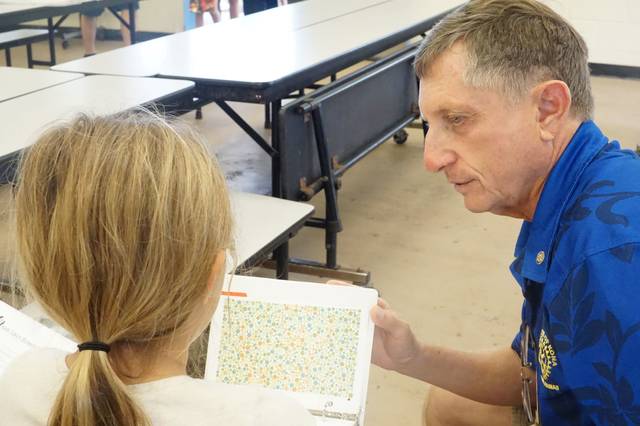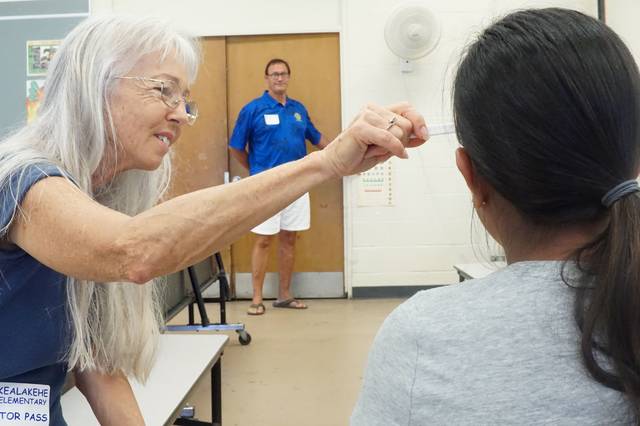Focus on success

Tom Fine conducts a color perception test with a student at Kealakehe Elementary.

Photos by CAMERON MICULKA/West Hawaii Today
Janice Gustin conducts a vision test with a student at Kealakehe Elementary School.
KAILUA-KONA — For students developing their reading skills, good vision — and screenings to catch any potential problems — can make the difference.
KAILUA-KONA — For students developing their reading skills, good vision — and screenings to catch any potential problems — can make the difference.
“We want to really maximize their educational opportunities,” said Carol Ann Von Hake, public relations chairwoman for the Rotary Club of Kona. “And at this point in their development in third grade, it’s when reading becomes exciting, when you can take a book and you can really dive in.”
ADVERTISING
On Friday, members of the Rotary Club of Kona, joined by volunteers from the community, helped screen 180 third-graders at Kealakehe Elementary School as part of its Keiki Vision program.
This year marks the club’s 11th year providing vision screenings. Rotary clubs throughout Hawaii started the project a few years after the state stopped administering vision screenings in 1995 because of budget cuts.
“We felt it was so important,” Von Hake said, “and it was such a critical part of a child’s development.”
During the end of August and throughout this month, the Rotary Club of Kona will screen students at six schools, with Von Hake estimating about 1,000 students will be screened during that time period. The screenings test visual acuity, color perception and depth of field.
Rotary Club of Kona President Tom Bierlein said the screening results are reported to the school as well as an optometrist, and children identified as needing further evaluation are referred for that.
Bierlein also said if parents aren’t able to afford glasses fitted for their child, the club can take care of that.
He noted the crucial difference catching a vision impairment can have in a student’s education.
“Somebody who has a visual challenge might be incorrectly identified as a slow learner, held back because they can’t learn to read quickly enough,” he said, “simply because they need their vision corrected.”
Three staff members from All Eyes, a vision care provider, also assisted during Friday’s screenings, including optometry assistant Modesto Bala.
In addition to the educational advantage of screening third-graders, Bala noted some conditions, including amblyopia, commonly referred to as lazy eye, can be addressed if caught early enough.
“Your binocular cells develop by the age of 9,” he said, “and so if there’s a need of correction with one eye or the other eye, it needs to be addressed right away so that binocular cell will develop in the back of the brain.”
Seeing groups such as the Rotary Club of Kona taking an interest in children’s vision, makes him feel grateful, Bala said.
“It’s equipping them to have a better education,” he said.
The Rotarians’ work Friday extended beyond the vision screenings. Once done with their screening, each student also received a free dictionary.
“For some of them, it’s the first book they’ve ever received and owned,” said Bierlein, adding that even some adults don’t appreciate the value of a dictionary.
“And not every home has a computer and the capability of Googling,” Von Hake said, “so for these kids to have a dictionary, it’s their only source of word knowledge because not every household can afford a computer.”
And the day’s events are also fun for volunteers such as Brian Asbjornson, who said this and scholarships are his favorite parts of the year.
“So we get to see them at the beginning of their lives and, now, have some of the kids we’ve given vision tests to, we could be giving scholarships to them at the end of the year,” he said.
A former teacher, Asbjornson said events like these are “leveling the playing field” between students who have adequate access to vision care and those who don’t.
“So we’re kind of a first chance to get them to an optometrist where they can get lenses or corrective action,” he said.
Email Cameron Miculka at cmiculka@westhawaiitoday.com.


